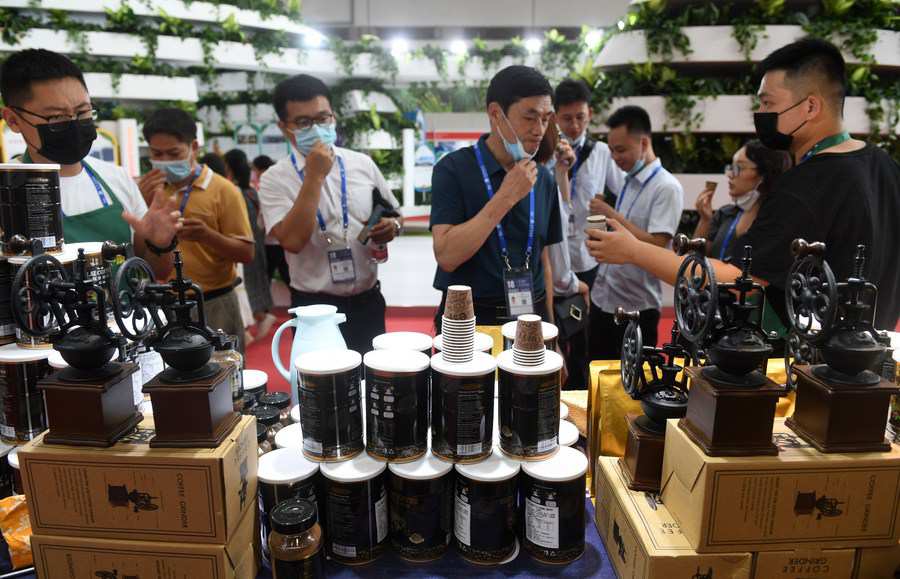
Visitors try out coffee products from ASEAN countries at the 18th China-ASEAN Expo in Nanning, capital of south China's Guangxi Zhuang Autonomous Region, Sept. 10, 2021. (Xinhua/Lu Boan)
This is the eighth straight year that Malaysian entrepreneur Chai Kean King has attended the annual China-ASEAN Expo to expand his business in China.
For this year's expo, which opened Friday in the southern Chinese city of Nanning, Chai has brought edible bird's nests, coffee and other Malaysian specialty products made by his food company, hoping to captivate expo visitors and find more business partners.
Enterprises from over 40 countries and regions are participating in this year's China-ASEAN Expo, which is held both online and offline and boasts a total exhibition area of 102,000 square meters.
For Chai, attending the expo for eight years in a row has not always been easy. Last year, he traveled from Malaysia to China to take part in the event despite COVID-19-induced travel restrictions and quarantine measures.
"We spared no effort to attend last year's expo because we had found many of our business partners at the event," he said. "We have sold a lot of our products at previous editions of the expo and have further tapped into the Chinese market through this platform."
Chai's growing business in China mirrors the booming trade and strong bilateral ties between China and the Association of Southeast Asian Nations (ASEAN) over the past decades.
Since China and ASEAN established dialogue relations in 1991, the two sides have seen bilateral trade skyrocket from 8.36 billion U.S. dollars to 685.28 billion U.S. dollars in 2020, an increase of over 80 times, according to Chinese customs data.
The two sides have bucked the global downward trend, and last year they became each other's largest trading partners. Such robust trade expansion has continued in 2021, with bilateral trade volume registering a 38.2 percent year-on-year growth in the first half of this year, according to official Chinese data.
Besides trade and economic cooperation, China and ASEAN have been committed to extensive cooperation in various other fields, including security, education and tourism, to safeguard regional stability and promote common development and prosperity.
China's official data shows that personnel exchanges between the two sides exceeded 65 million in 2019 before the onslaught of COVID-19. They have exchanged over 200,000 students and formed more than 200 pairs of sister cities.

Aerial photo taken on April 15, 2020 shows Qinzhou Port in south China's Guangxi Zhuang Autonomous Region.(Xinhua/Lei Jiaxing)
China-ASEAN dialogue relations have "evolved into a multifaceted strategic partnership and shown tremendous progress on all fronts," said Dato Lim Jock Hoi, the secretary-general of ASEAN, via video at the opening ceremony of the 18th China-ASEAN Expo on Friday.
Amid the still-raging pandemic and rising protectionism and unilateralism around the globe, China-ASEAN ties have grown even stronger with all-round cooperation on COVID-19 prevention and control, trade and other fields.
ASEAN countries donated medical supplies to support China when it was experiencing peak epidemic conditions last year, and China returned the favor by dispatching medical teams, providing medical supplies, sharing prevention and treatment experience and enhancing vaccine cooperation.
As China and ASEAN mark the 30th anniversary of their dialogue relations this year, both sides are eyeing closer ties and comprehensive collaboration in more fields.
Chinese Vice President Wang Qishan said Friday, when addressing the opening ceremony of the China-ASEAN Expo, that "China is committed to promoting better development of bilateral ties in the next 30 years."
China is willing to work with ASEAN to align the Belt and Road Initiative with ASEAN countries' development strategies to jointly foster strategic partnership at a higher level, and expand economic and trade cooperation, while promoting regional connectivity and economic integration, to improve the well-being of the people, Wang said.
In a video speech at the ceremony, Malaysian Prime Minister Ismail Sabri Yaakob said that he expected the Regional Comprehensive Economic Partnership (RCEP) to "serve as an integral tool to navigate our region to a path of recovery and growth in the near future."
The RCEP, the world's largest free-trade deal, was signed last year by 15 Asia-Pacific countries, including ASEAN's 10 member states and China. It is widely deemed a massive move for regional economic integration, multilateralism and free trade.
"This agreement (RCEP) provides immense opportunities to bolster regional supply chains and businesses to diversify production networks that are imperative for seamless integration into the global economy," said Ismail Sabri.





